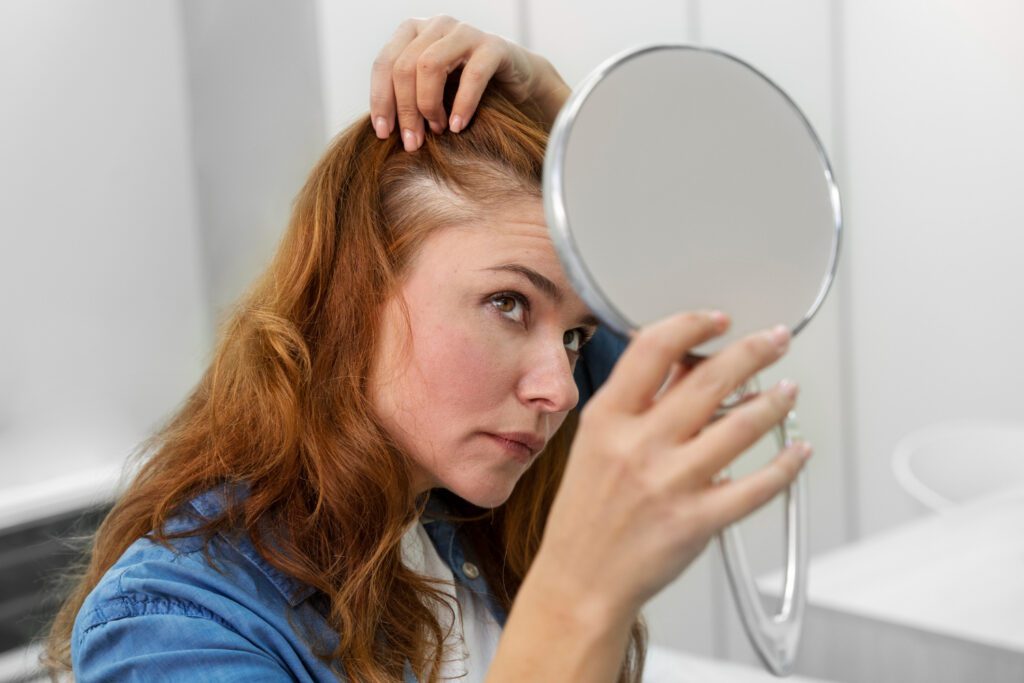This Post Contains Affiliate Links. Please Read Our Disclosure for Full Information.
Hey hey, gorgeous! 💕
Let’s talk about something that literally no one wants to deal with: hair loss. Ugh, right? One day your hair is giving “main character energy” and the next… it’s shedding like it’s going out of style. 😩
Spoiler alert: hormones are usually the sneaky culprits behind this madness. But don’t stress, boo—I’m here to spill the tea on which hormones are causing the drama and how you can fix it like the absolute boss babe you are! 💅

💣 1. DHT: The Hair Villain You Never Invited
DHT (aka Dihydrotestosterone) is that shady hormone that shrinks your hair follicles and causes thinning—especially if you’re genetically sensitive to it (hi, thanks mom or dad 🙃).
✅ Solution: Look for shampoos with saw palmetto or caffeine that help block DHT naturally.
🌀 2. Thyroid Hormones: The Overachiever or the Slacker
Both hypothyroidism (too low) and hyperthyroidism (too high) can cause hair fall, dryness, and even that straw-like texture we definitely don’t want.
✅ Solution: Get your TSH, T3, and T4 levels checked and consider adding iodine, selenium, and zinc to your routine.
👉 Try a Thyroid Support Supplement
🌙 3. Estrogen: The Queen of Hair (When She’s Balanced)
Low estrogen (hello, post-pregnancy or menopause) can make hair thin, dull, and lifeless. High estrogen can sometimes trigger weird shedding too. Hormones love to be extra.
✅ Solution: Include phytoestrogens (like flaxseeds & soy) or consider talking to your doc about balancing estrogen.
💥 4. Cortisol: The Stress Hormone That Wrecks Everything
Stress = cortisol spikes = hair fall city 🫠. If you’ve been super stressed, your hair feels it too. This is called telogen effluvium and it’s a whole mess.
✅ Solution: Try adaptogens like ashwagandha and mindfulness to keep cortisol chill.
👉 Shop Ashwagandha Supplements
🔄 5. Insulin: The Sneaky Blood Sugar Diva
Unbalanced insulin levels (especially with PCOS) can totally trigger hair loss and even hair growth in weird places (chin, anyone?).
✅ Solution: Keep blood sugar stable with low-GI foods and myo-inositol supplements.
💡 Quick Fixes + Hair Love Must-Haves:
✨ Silk Pillowcases to reduce breakage 👉 Shop Here
✨ Biotin Gummies for stronger strands 👉 Shop Biotin
✨ Scalp Massager for circulation 👉 Shop Here
💖 Final Hair Flip Thoughts:
Babe, if your hair’s acting up, it’s probably your hormones throwing shade—but the good news is: you’re in control.
With a little TLC, some smart self-care, and maybe a few cute Amazon finds, you’ll be flipping your gorgeous locks in no time. Because you deserve hair that’s as fabulous as YOU are! 💁♀️✨
xoxo,
Serenity Talks
We are giving it for free to our users
Get 7 Free Digital Planner
The Bundle Includes -
Daily Planner, Weekly Planner, Monthly Planner, Self Care Planner, Daily Reflection, Goal and Habit Tracker, Gratitude Journal and Budget Tracker

